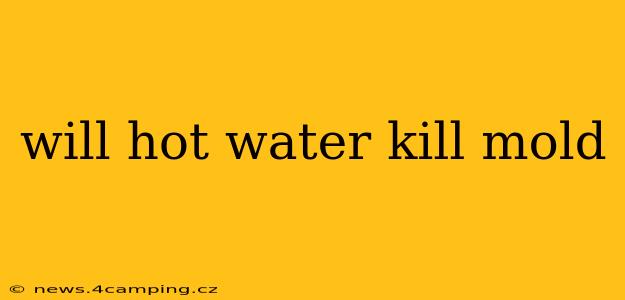Mold is a pervasive issue that can affect homes and other structures, impacting both the structure's integrity and the health of its occupants. While many people turn to cleaning solutions, a common question arises: will hot water kill mold? The short answer is: it depends. Hot water can be effective in some situations, but it's not a guaranteed solution for mold removal and may not be effective against all types of mold. Let's delve deeper into the nuances of using hot water against mold.
How Effective is Hot Water Against Mold?
Hot water can be effective at killing mold spores and even some established mold colonies, particularly when combined with scrubbing to physically remove the mold. The heat disrupts the mold's cellular structure, hindering its ability to reproduce and grow. However, the effectiveness hinges on several factors:
-
Water Temperature: The water needs to be significantly hot, generally above 140°F (60°C), to be truly effective. Lower temperatures may only temporarily slow down mold growth but won't eliminate it. Boiling water is the most effective but requires careful handling to avoid burns.
-
Mold Type: Different types of mold have varying levels of heat tolerance. Some hardy mold species may survive even exposure to boiling water.
-
Mold Severity: For minor mold infestations, hot water cleaning might suffice, especially when followed by thorough drying. However, extensive mold growth requires a more aggressive approach, such as professional remediation.
-
Surface Material: Porous surfaces like wood absorb water, making it difficult for hot water to penetrate deeply enough to kill all the mold. Non-porous surfaces like tile are easier to clean with hot water.
What are the Limitations of Using Hot Water to Kill Mold?
While hot water can be a part of a cleaning solution for mold, it's crucial to understand its limitations:
- Not a Complete Solution: Hot water primarily kills surface mold. It may not eliminate mold embedded within walls, ceilings, or other materials.
- Potential for Spreading: Improper handling of mold can spread spores to other areas, worsening the infestation.
- Health Risks: Hot water can cause burns if not handled with care. Mold itself can pose respiratory or allergic health risks.
- Ineffective Against Deep-Seated Mold: Hot water isn't effective for extensive mold growth that has penetrated materials or spread beneath surfaces.
Can Hot Water Kill Black Mold?
Black mold (Stachybotrys chartarum) is a particularly toxic type of mold. While hot water might kill some surface black mold, it's insufficient to address the health risks associated with black mold exposure. Never attempt to clean extensive black mold infestations yourself. Black mold remediation requires professional intervention due to its potential health hazards.
What are the Best Methods for Mold Removal?
For effective mold removal, a combination of methods is often necessary:
- Professional Remediation: For extensive mold growth or black mold, professional remediation is crucial. Professionals have the expertise, equipment, and safety measures to handle mold infestations safely and effectively.
- Cleaning Solutions: Bleach solutions (diluted properly) are effective against many types of mold. Always follow safety precautions when using bleach.
- Drying: Thoroughly drying the affected area is vital to prevent mold regrowth. Use dehumidifiers and fans to aid in drying.
- Prevention: Addressing moisture issues is key to preventing future mold growth. Repair leaks promptly, improve ventilation, and maintain low humidity levels.
Is Hot Water a Good First Step for Mold Removal?
Hot water can be a useful first step for cleaning small, superficial mold spots on non-porous surfaces. However, it shouldn't be considered a standalone solution. Always assess the extent of the mold infestation before attempting any cleaning. For larger areas or any suspicion of black mold, consult a professional mold remediation specialist.
Conclusion
While hot water can play a role in cleaning minor mold infestations, it's crucial to understand its limitations. Hot water should be used as part of a broader approach to mold removal, and professional help should be sought for larger or more severe infestations. Remember, safety and effectiveness are paramount when dealing with mold.
